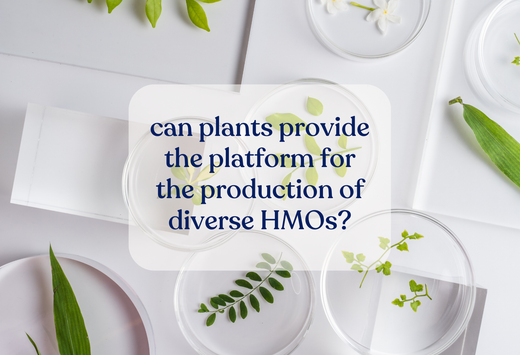Human milk oligosaccharides (HMOs) are a unique and essential class of complex carbohydrates found in human milk, playing a critical role in infant health. These molecules help establish the gut microbiota, enhance immune development, and reduce gastrointestinal disorders. While nearly 200 HMOs have been identified, current commercial production methods using microbial fermentation are limited to producing only a small subset of simple HMOs. This limitation restricts their use in infant formula and adult health research. To overcome this challenge, this study explores the potential of genetically engineered plants as a scalable, sustainable, and cost-effective platform for the production of diverse HMOs, including complex structures such as lacto-N-fucopentaose I (LNFPI) and acidic HMOs.
The research utilised Nicotiana benthamiana, a plant species well-suited for genetic engineering due to its rapid growth and compatibility with molecular tools. The production strategy involved the transient expression of bacterial and mammalian glycosyltransferases, enzymes essential for synthesizing HMOs. This approach enabled the production of neutral, fucosylated, and acidic HMOs within the plant system. Additionally, stable expression in transgenic plants was pursued to optimize long-term production.
For the identification and quantification of HMOs, liquid chromatography and mass spectrometry (LC-MS) were employed. A thorough purification protocol was developed to remove contaminants like sugars and phenolic compounds, ensuring a clean HMO product. To validate their functionality, the plant-derived HMOs were tested for prebiotic activity using bacterial growth assays. These tests specifically examined the impact of HMOs on Bifidobacterium longum subsp. infantis, a bacterium known to consume HMOs and play a key role in infant gut health. Finally, a technoeconomic analysis was conducted to compare the costs of plant-based HMO production with microbial fermentation methods.
The results of the study revealed that engineered plants successfully produced all three classes of HMOs: neutral HMOs such as lacto-N-tetraose (LNT), fucosylated HMOs like 2'-fucosyllactose and LNFPI, and acidic HMOs, including 3'-sialyllactose and 6'-sialyllactose. Notably, complex HMOs such as LNFPI, which are challenging to produce using microbial systems, were efficiently synthesized in plants. Functional validation showed that plant-derived HMOs exhibited bifidogenic activity, selectively promoting the growth of Bifidobacterium longum subsp. infantis. This prebiotic effect closely mirrored the activity observed with HMOs purified directly from human milk, confirming the efficacy of the plant-derived molecules.
The study also highlighted significant economic and environmental advantages of plant-based HMO production. The technoeconomic analysis demonstrated that the minimum selling price (MSP) of HMOs produced in plants ranged between $4.90 and $18.40 per kilogram, particularly when ethanol co-production was included. In contrast, microbial fermentation methods yielded an MSP of approximately $45 per kilogram. Beyond cost savings, plants offer additional sustainability benefits, including the ability to absorb atmospheric carbon dioxide during growth and requiring fewer resources compared to microbial systems.
This research showcases the transformative potential of engineered plants as a sustainable and scalable platform for producing diverse HMOs, including complex structures like LNFPI. The plant-derived HMOs demonstrated functional efficacy comparable to those derived from human milk, making them a promising solution for enhancing infant formula and supporting adult gut health interventions. The economic viability, environmental sustainability, and ability to produce a wide range of HMOs position plants as a groundbreaking platform for future HMO production. This innovation paves the way for broader research and applications targeting gastrointestinal health for both infants and adults.

